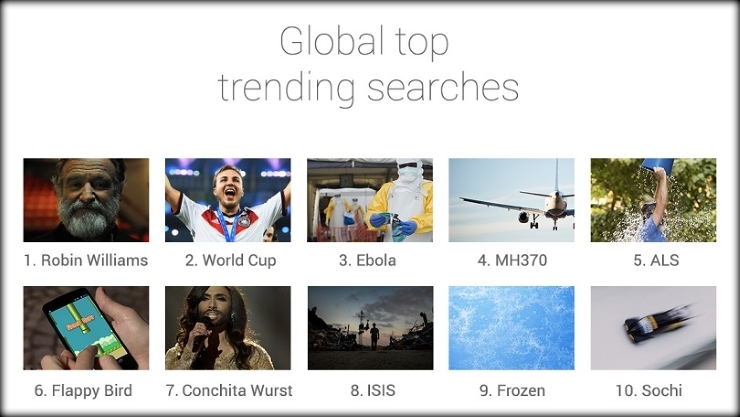Had this e-mail dialogue with my friends last night (by “dialogue” I mean I responded to one e-mail, then no one responded after me). Figured I’d move it over here. If you’d like to see a little bit about the top 10 searches of the year, read the official Google blog, or a couple of other profiles, like this one and this one.
In order:
Robin Williams: Obviously, this is because he died — and died too soon. We love that, as people. (See: The Kennedys.) He also was potentially tormented before his death, and I do think people find a disconnect between “someone who could be so funny and inspired so many others through films” and “someone who was deeply suffering themselves.” People find that interesting. ABC News wrote a whole article about it. I think you’d probably argue that Williams was the biggest celebrity death of 2014, and celebrity deaths tend to rank high on these lists — for example, Nelson Mandela and Paul Walker were near the top of the 2013 lists. I don’t know if this ranking says a lot about us as humans except that we’re curious and saddened by death, especially of inspiring people.
World Cup: Pretty much the largest sporting event in the world, so a top-2/3 ranking in the year it occurs is expected. It happened in 2010 too, although Justin Bieber was a big search that year.
Ebola: The Ebola Fighters became TIME’s Person of the Year, and it was no doubt a big story — although I think this is the spot where this list starts to go a little off the rails. No. 1 was a death, and No. 3 is a horrible disease. I bet there were a handful of people Googling around this topic not for news, but for (a) pictures of people with ebola or (b) some evidence that the government or some other entity was covering something up. (Like this!) By “handful,” I mean “millions.”
MH 370: Surprised this wasn’t 2 or 3, honestly. Who the fuck loses a plane? That doesn’t happen that often. The conspiracy theories are still swirling. Reddit is buzzing. But now, if you’re scoring at home, humanity clearly favors the mysterious and macabre: a death, a disease, and a missing plane are 75 percent of the top four.
ALS: This is the sad one — I doubt people were really Googling around ALS and what it means/what it is, etc. They were looking at Ice Bucket Challenge videos. You can argue the Ice Bucket Challenge was a success, and you can see some money rolled in. You can also argue it’s totally misguided and more about people doing funny shit with their friends — in short, it focused on “viral,” but it didn’t necessarily “retain” people learning about ALS. I think more people were searching for this, you know?
Flappy Bird: You can take this being listed a lot of ways; I personally think it’s a testament to the power of things being viral — i.e. ALS, above — and how coding has become important enough in our world that people want to learn more about what makes unremarkable games into major successes.
Conchita Wurst: Austrian drag queen, eh? Had no idea. I would hope this is a sign that people are becoming more comfortable with different forms of sexuality and humanity being present in society. In reality, this probably has to do with how entertaining he/she is. I could be wrong.
ISIS: This is a bad one — we’re back to the macabre — and again, I’d argue a lot of the searches are probably for the actual beheadings, not for information about ISIS and what it all means. People love sick shit like that. (A generalization, yes.) Have I ever searched for a beheading? I think I honestly have, once or twice.
Frozen: This might be the most uplifting thing on this list. My hope is that this speaks to the idea that young children, when in possession of iPads/etc., know how to search for things. I hope five year-olds drove this one up.
Sochi: Again, major global sporting event.
Bottom Line: It seems that society likes death, macabre things, major mysteries, and huge sporting events. Seems logical. Here’s a quick look at how the global search terms differed from the U.S. search terms — it wasn’t by much — and if you want to underscore that people are more interested in crazy/bad stuff happening, consider this. The No. 1 NBA-related search of 2014 was Paul George, who broke his leg horribly in a Team USA scrimmage. It wasn’t LeBron James, the best player in the world who had his “homecoming” in 2014.
